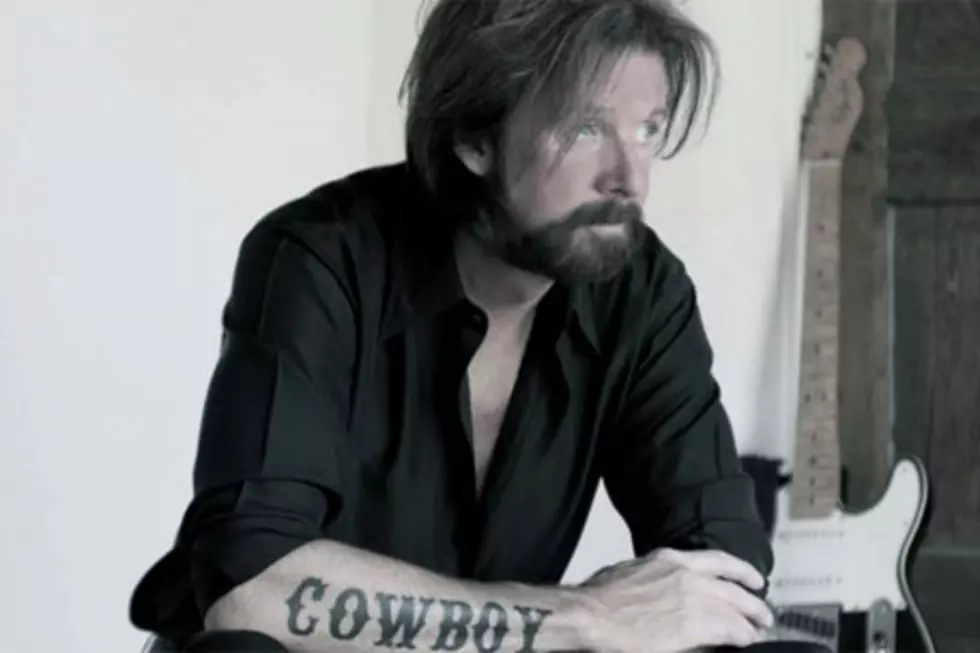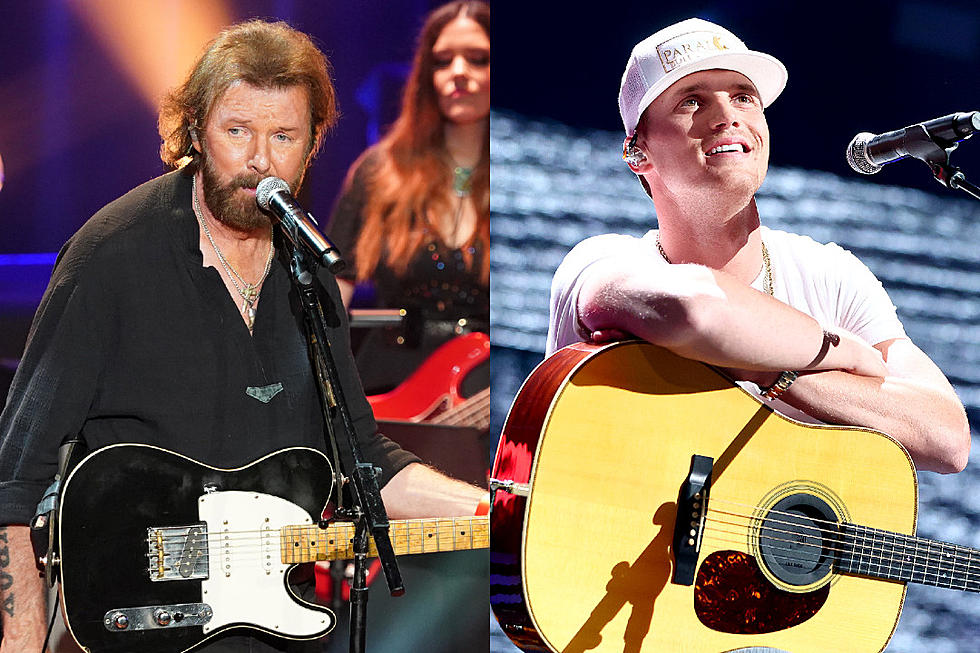
Ronnie Dunn Lets His Inner Cowboy Rock
Ronnie Dunn spent 20 years as one-half of the most awarded duo in country music, Brooks & Dunn. The 58-year-old surprised fans, and even his own family, when he made the decision to embark on a solo career, after selling more than 30 million albums with his partner, Kix Brooks. The Boot sits down with Ronnie to talk about what it's like to essentially start over in the music business, the role his wife plays in his decision-making and why retirement is nowhere in his near future.
Were you surprised when your self-titled debut album went all the way to No. 1?
I was. I always think I'm not going to give myself any credit or build myself up ... [It was a] time when there weren't that many records coming out, and it went to the top of the charts.
Your first single from the album, 'Bleed Red,' was a really powerful, emotional song. Was it an intentional decision on your part to lead off with a song that was so serious?
I was thinking that [the current single] 'Let the Cowboy Rock' was going to be the title of the record, and I was going to let it out as a single, keep rocking and just blow on through everything. I didn't want to get too deep with things. The powers-to-be at the label and management sat down and had an intervention. They were really trying to distance what I was going to do, initially, from anything that sounded even close to Brooks & Dunn product, which is almost impossible. In fact, to me, it is. ... They chose 'Bleed Red.'
I recorded over 30 songs. It was my way of trying different things just to see what we should use. I picked 10. I did 'Bleed Red' and another one on the record called 'Once,' which I thought were pretty strong departures from anything we had done or I had done in the past. Sure enough, they chose 'Bleed Red' as the first single. And I say this over and over, had I walked into my closet to put on a pair of boots, that would not have been the pair I would have chosen, but it went to the Top 10.
You followed 'Bleed Red' with another powerful song, 'Cost of Livin',' which seemed to really resonate with people all over America. Were you worried about having two songs back-to-back that were so sentimental?
In the middle of 'Bleed Red' coming out, a huge disproportionate majority of people in radio came to us and asked if they could have 'Cost of Livin'' as a single. There was even talk behind closed doors about pulling 'Bleed Red' because they had caught wind and heard 'Cost of Livin'.' We went with that. I think it struck an emotional chord in line with what's going on today ... It's just not commercially tailored -- and we knew that going in. But radio wanted it and they got it. We were going to put 10 songs on, and then 'Cost of Livin'' was negotiated at the last minute and we got 11 on there. I was sitting down and looking at putting songs on a project, from one to 11. I just wanted a certain amount of continuity that felt more fresh, to an extent.
You've said that you think of yourself as a "fledgling solo artist." After so much success in country music, is that how you really perceive yourself?
The procedure is, no matter who you are, you have to back up. The odds are against making any kind of splash, I think, when you break away from an established group or act, especially for as long as we did it, and an age that's relevant to going out and doing something. When I talked to my agents and management and promoters about doing shows this year and last, we had to go about the same strategy as a new solo act would. You have to step back. The money is the least relevant issue. It's how do you strategize and go about the process, playing bars, beer joints, truck stops and casinos, just getting used to it. I did that a lot last year and I'll do it this year, too.
How has Janine, your wife of almost 22 years, helped you in the transition from being part of a duo to being a solo artist?
She's pretty into it. She was a little bit surprised that I pushed the eject button on the Brooks & Dunn thing without really talking to her, or anyone else. But it was something I had been thinking about long and hard for a long time. She's full force on board with this. She was talking to me the other day about doing another record and wanting to help with the A&R process, which has always been the case. You walk around the house going, "Well what do you think of this?" If she hates a song, I won't do it. She's pretty much in favor of it.
In the middle of working on your solo album, you surprised everyone, including your wife, by getting a tattoo of the word "Cowboy" on your forearm. What was that experience like, getting such a large tattoo?
I read an article in Men's Journal about this guy who had a bunch of tattoos. He was talking about having them taken off and he said it's ten times more painful taking them off than putting them on. I can't imagine, because it's like being doused with hot grease.
Music consumes so much of your life. How do you unwind? What are some of your favorite things to do when you aren't playing or recording?
That's a problem. In the last couple years, I've gotten into photography a little, but not really. I went to 13 schools in 12 years. We moved all over the place. Music the only thing that I could get behind ... I wasn't that good at socializing. I'm still not.
Your father was a truck driver and your mother was an avid churchgoer. You moved around a lot as a child. How has your upbringing affected your music?
[My parents] were both adamantly into country music. My father was an aspiring country singer and songwriter. He just didn't get that off that ground. I was afraid, very tentative to do anything with music for years. I didn't tell him I was playing in bands when I was away from home, because it had been such an unpleasant experience and a letdown for him. He just did his day job, drove trucks and stuff, while he lived his dream. I was really afraid to get involved. I'm still very respectful of the downside. Maybe too much so.
Some of your heroes, like Merle Haggard and Willie Nelson, continue to play and perform when they could be retired and taking it easy. Do you think you'll be like them, and play as long as you can, or can you foresee a time when you'll be content to relax a little bit?
I had that very conversation with Janine, and at the time I said, "I don't know. I don't have any hobbies. Music is my hobby." I've said with her I'm at the point where I don't know if I'm going to be Willie, metaphorically, and get on the bus and ride off into the sunset. The other alternative is, I don't know what I would do.
Watch Ronnie Dunn's 'Let the Cowboy Rock' Video
More From TheBoot




![Ronnie Dunn Taps Parker McCollum for Rueful ‘Road to Abilene’ [Listen]](http://townsquare.media/site/204/files/2022/07/attachment-Ronnie-Dunne-Parker-Mccollum-the-road-to-abilene.jpg?w=980&q=75)

![Ronnie Dunn Is Surrounded by ‘Broken Neon Hearts’ in New Song [Listen]](http://townsquare.media/site/204/files/2022/02/attachment-GettyImages-1332787817-e1645626952917.jpg?w=980&q=75)


